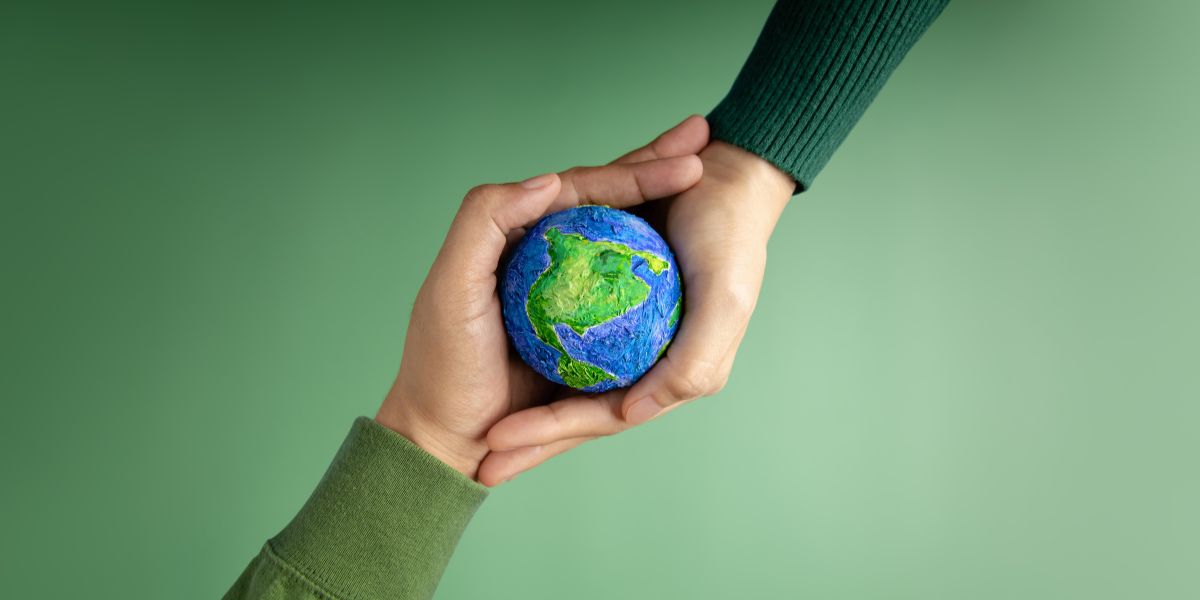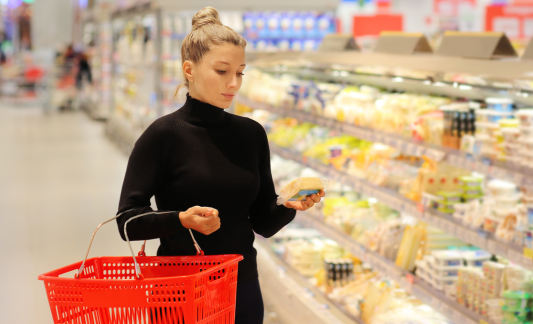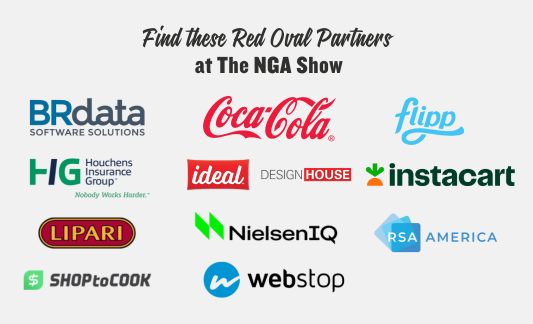Help Isom IGA recover from devasting floods

This Earth Week, we are delving into the sustainability journeys of our Red Oval CPG partners. In an era where environmental consciousness is increasingly important, these companies have made significant strides toward reducing their ecological footprint while simultaneously enhancing their products. From achieving remarkable milestones like zero-waste-to-landfill sites to pioneering packaging solutions that seamlessly integrate into the recycling stream, these are just a few of the many Red Oval partners demonstrating a steadfast commitment to sustainability.
The Coca-Cola Company
Eco-Friendly Packaging Solutions
The interconnected global challenges of packaging waste and climate change have made eco-friendly packaging a focus for the Coca-Cola Company's business and communities. Coca-Cola’s sustainable packaging strategy aims to create systemic change through a circular economy for its packaging, from how bottles and cans are designed and manufactured to how they’re recycled and reused.
The worldwide beverage company is leveraging its scale and reach across markets to reach their sustainability goals, suppress waste pollution, and reduce its carbon footprint. Coca-Cola launched World Without Waste in 2018 which centers around three primary goals:
- Making 100% of its packaging recyclable globally by 2025, and using at least 50% recycled material in packaging by 2030
- Collect and recycle a bottle or can for each Coke product sold by 2030
- Bring people together to support a healthy, debris-free environment
A video highlighting Coke's recyclable bottles
SC Johnson
Reducing Plastic Pollution
SC Johnson's sustainability goals include designing products and packaging so that it gets into the recycle stream rather than the waste stream. Concepts like climate optimism and initiatives like the Blue Paradox – an exhibit showing the scale of the ocean plastics crisis – encourage collective action and drive meaningful change to safeguard our ocean for future generations.
SC John's Blue Paradox initiative demonstrates the scale of the ocean plastic crisis
SC Johnson is working toward removing black plastic, which often contains carbon black additives that hinders the sorting processes during recycling. To date, the company has eliminated more than 5 million kilos of unnecessary or problematic plastic packaging like glued labels, black plastic, and multilayer films from its portfolio.
Another sustainable solution is printing labels directly on bottles and using perforated sleeve labels to reduce the risk of adhesive and incompatible material contamination in the recycling process. SC Johnson is working to perforate all of its shrink sleeve labels by 2025.
The J.M. Smucker Company
Waste Diversion, Less Water and Energy Intensity, and Reducing Emissions
J.M. Smucker Company is delivering a more sustainable approach to its operations and value chain through a focus on climate action, natural resource stewardship, and responsible sourcing and packaging.
The company has set these environmental impact goals along with several others:
- Reduce water intensity at company-owned facilities by 5% by 2025 (vs. 2019 base year).
- Reduce energy intensity at company-owned facilities by 5% by 2025 (vs. 2019 base year).
- Reduce absolute scope 1 and scope 2 greenhouse gas (GHG) emissions 28% by 2030 (from a 2019 base year).
- Reduce scope 3 GHG emissions 22% per unit of sold product by 2030 (from a 2019 base year).
- Achieve TRUE (Total Resource Use and Efficiency) certification at 100% of company sites by 2030. The TRUE certification program helps facilities quantify their performance and find additional ways to improve their progress toward zero waste
Mondelēz International
Meeting ESG Priorities
Mondelēz International is on a mission to lead the future of snacking by offering the right snack, for the right moment, made the right way -- meaning snacks are not only right for people but also right for the planet. With that in mind, the company has set clear environmental, social, and governance (ESG) priorities to reduce their environmental footprint and have a positive, lasting impact on people and communities as they continue to grow.
Below are some highlights from Mondelēz International's ESG priorities, with more progress available on the company's Goals & Progress page.
- 100% of cocoa volume for chocolate brands sourced through Cocoa Life by 2025.
- 35% end-to-end CO2e emissions reduction by 2030 (vs. 2018).
- Aim to reduce virgin plastic by 5% and virgin rigid plastic by 25% by 2025 (both vs. 2020).
- Aim to have approximately 98% or more of their packaging designed to be recyclable by 2025.
- 10% absolute water usage reduction in priority sites and 15% food waste reduction in internal manufacturing sites by 2025 (both vs 2018).
Clorox (Kingsford)
Emissions Control, Zero Waste, Local Sourcing, and More
The Kingsford brand has supplied consumers with high-quality charcoal products since the 1920s. Today, Kingsford is the leading U.S. charcoal brand and an industry leader in environmental manufacturing controls, circularity, and product sustainability.
Here are some ways the brand is advancing sustainability in its operations and products.
- Emissions control: The Kingsford brand’s state-of-the-art air emissions controls for its wood-charring and briquet-producing operations include dust collectors and equipment systems such as enclosed conveyors and storage tanks.
- Zero waste to landfill: All Kingsford manufacturing plants are zero-waste-to-landfill sites, achieving this status three years ahead of the 2025 goal.
- Energy consumption: Kingsford plants reuse the energy created during the wood-charring process by using heat to dry incoming wood and finished charcoal briquets while also powering steam generators used for other manufacturing operations.
- Manufacturing recycle loops: Kingsford plants recover and recycle wood dust, char dust and briquets broken during the manufacturing process.
- Local sourcing of wood: Kingsford charcoal is made from locally sourced wood and other natural ingredients. To minimize their environmental impact, they convert more than 1 million tons of wood leftover from local mills into high-quality briquets every year.
- Product innovation: The breakthrough technology of Kingsford charcoal with Sure Fire Grooves reduces the amount of raw materials necessary to make a charcoal briquet while outperforming the original product.
- Packaging innovation: The Kingsford brand only uses certified, sustainably sourced fiber in its packaging.
Unilever (Hellman’s)
Save the Sandwiches
At the current rate of soil erosion, sandwich ingredients like mayo will cease to exist by 2043. Over the next five years, Hellman’s is collaborating with over 1,000 soybean farmers to save our sandwiches from extinction and ensure a tastier future for all.
Hellman's is making a $30 million commitment over the next five years to help farmers in the U.S. and Canada embrace regenerative farming practices such as cover cropping, which will help ensure the ground is covered with plants year-round to protect it from erosion and nutrient loss, even in the face of extreme weather. Without these types of practices, the equivalent of one soccer field of soil is lost every five seconds due to erosion.
Unilever itself has also established various sustainability goals towards climate, nature, plastics, and livelihoods. Some of those goals include:
- Reduction of absolute operational GHG emissions (Scope 1 & 2) by 100% by 2030 (vs. 2015).
- Have 95% volume of key crops to be verified as sustainably sourced by 2030.
- Have 100% of plastic packaging to be reusable, recyclable or compostable – by 2030 (for rigids) and 2035 (for flexibles).
To see the full list of sustainability goals and long term ambitions, click here.
You May Also Like
These Stories on Red Oval Roundup
Feb 5, 2026 7:09:48 PM |
2 min read
Feb 5, 2026 6:04:49 AM |
3 min read
Jan 29, 2026 10:51:02 AM |
7 min read



No Comments Yet
Let us know what you think